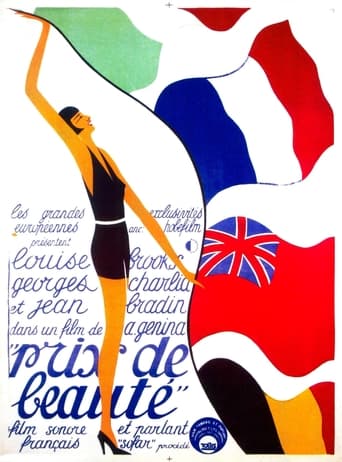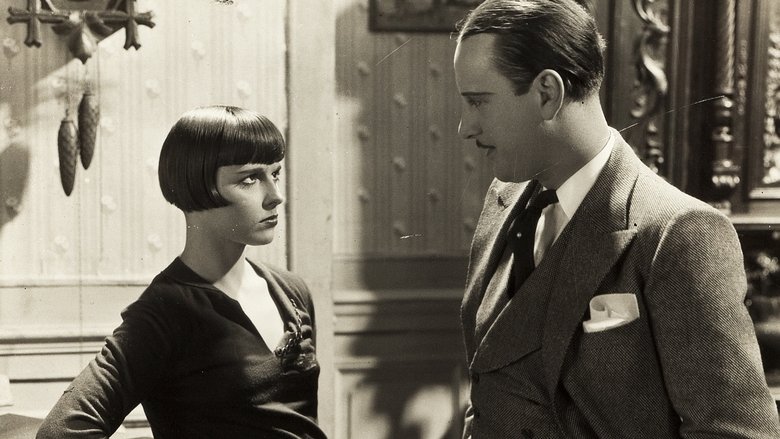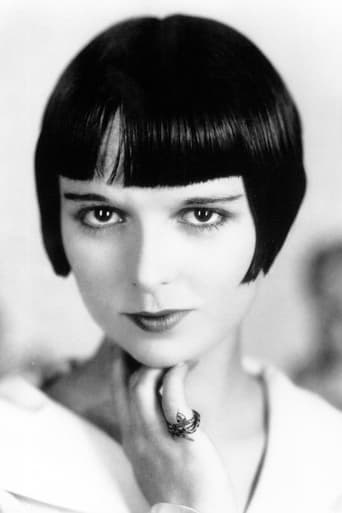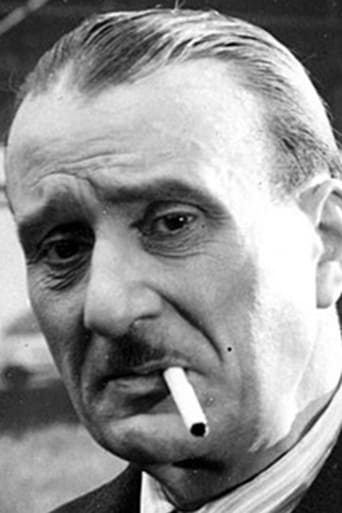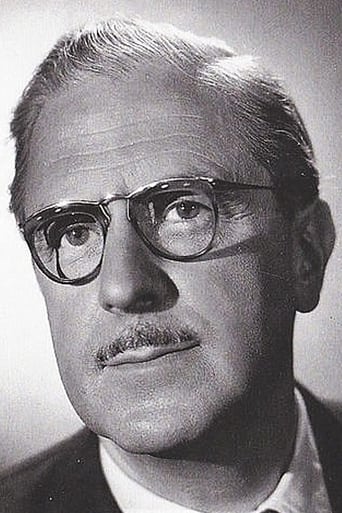Lucienne, typist and gorgeous bathing beauty, decides to enter the 'Miss Europe' pageant sponsored by the French newspaper she works for. She finds her jealous lover Andre violently disapproves of such events and tries to withdraw, but it's too late; she's even then being named Miss France. The night Andre planned to propose to her, she's being whisked off to the Miss Europe finals in Spain, where admirers swarm around her. Win or lose, what will the harvest be?


Reviews
A wonderful surprise! I've always heard that Louise Brooks' follow-up to her two star-making hits with G.W. Pabst was a pleasant but inconsequential swan song. I thought it was very good, with an absolutely brilliant performance by Brooks. Co-written by Pabst and Rene Clair, this is basically a silent movie with overdubbed sound. Thus, the director is able to avoid the stodginess that comes with early sound filmmaking. He uses a very intimate, fluid style with the camera drifting through crowds to discover the beautiful Ms. Brooks' face. The one big problem the film has is that Brooks' love interest (Georges Charlia) is so totally unworthy of Brooks from the start that you can never come close to sympathizing with him. But that's not that important, really. Brooks plays Charlia's fiancée. He forbids her from entering the Miss France contest, but she's already done so. When she wins the opportunity to compete for Miss Europe, she chooses to disobey him. When she wins the competition, the fame and male attention drives her back to Charlia. But poor, married life soon seems much worse to her. The film is extremely worthwhile just for the expressions of Brooks' face alone. Though she has words, as dubbed in by a French actress, she doesn't need them. Her smiles seem created by a filmmaking Leonardo, and her pains are ours. Lulu could never have survived in the talkies (and I've seen the proof, a short film she made with Roscoe Arbuckle shortly after this one), and perhaps the loss of Brooks is the greatest of the talking picture era.
Prix de Beauté is an interesting late Louise Brooks vehicle. Initially much lighter in tone than Pandora's Box or Diary of a Lost Girl, there is a sudden twist in the narrative at the end which changes the way in which one looks at the entire film.Brooks here is at her best, though she is playing a somewhat more sympathetic character than those she portrayed in her two best known films. Amusingly, her character, Lucienne, is referred to as Lulu in the opening minutes of the film, recalling her previous year's success. Although her voice is overdubbed in French, Brooks carries the role convincingly with her masterful use of facial expressions, learned during her years making silents.The opening scenes show her fiancé, Andre, bullying a work colleague yet this is depicted in a slapstick manner, leading one to think the film will be a comedy.Andre is depicted from the outset as a largely unsympathetic character due to his domineering nature but there is a slight nuance to the performance and one feels increasing sympathy as it is shown that Brooks' character is more interested in the glamour of her new career than remaining loyal to him and her fickleness in love allows one to understand the turn events take at the end.One interesting technique used throughout the film is to contrast scenes of the organic (Brooks and the other pageant contestants) with extreme close-ups of the mechanical (such as the printing press, the piano and various clocks.) The scene of the bird trapped in the cage may be a cliché now but it works effectively in this film as a symbol of Lucienne's feelings of being trapped in a drab life by Andre.Sound is not used in a particularly innovative way in this film but the score is delightful and suits the atmosphere of the story. In particular, the early jazz music and bal-musette piece during the ballroom scene are lovely.The film is well paced and tension builds quickly, though not abruptly, as the mood changes towards the end. The lighting becomes almost noir-like and the scenes of Lucienne dying whilst her image lives on, happily, on the screen, are a wonderfully ironic touch.Overall, this film will be of most interest to fans of Brooks and connoisseurs of early French cinema. It falls short of being a masterpiece but it is well-executed and intriguing, making it a solid work that can be enjoyed by all.
Beauty prizes became a staple of many a municipality in the decade following the end of the Great War - perhaps they filled a gap left by many of the old throne and altar ceremonies of the ancien regime states that fell in 1918. In fact this beauty prize was set somewhere in northern Spain in 1930, when the Bourbons' were still in charge (just). We get a few brief glimpses of the girls on display, but I am at a loss to know what all the fuss was about.Opinion seems to be divided as to the merits of this film. That might be because different viewers have been seeing different versions. The one I saw (at London's National Film Theatre) was the silent version, but someone (I think the pianist, Stephen Horne) had interpolated a sound recording at the very end. It was a scratchy, haunting Edith Piaf. By this time Mr Horne had stopped playing. Lucienne Garnier (Louise Brooks) had stopped breathing, and the audience was left with no sound but that of Piaf as, on the screen, the occupants of a private cinema rushed about the body of Brooks beneath the movement of her recorded screen test. I don't know whether I have explained this well enough, but for me it was the best ending that I had seen (of a silent film) since I watched Anthony Asquith's "Shooting Stars" several years ago.The screenplay, by director Augusto Genina (and colleagues) seldom rises above the level of a soap opera, but this is beside the point. Having 'sold' Brooks to German audiences, G. W. Pabst (in league with Rene Clair) wished to do the same to the French. As 1930 was the end of the road for silent cinema - and as Brooks was no linguist - Pabst and Clair had a very narrow window in which to make a profit on Brooks. It didn't really work - French audiences were not quite moved, and Brooks was forced back to America where her reputation as a team player was, to put it mildly, low.Genina has produced a fine, naturalistic picture, on a subject well suited to his cosmopolitanism. The men in it (Georges Charlia as her dull and possessive fiancée, Andre; Yves Glad as a predatory, blacked up maharajah; Bandini as a randy White Russian playboy-prince) are almost incidental. They are simply walk-on characters that are required to give the film some momentum. For this is almost entirely about Brooks. Henri Langlois aptly likened the film to a lighthouse that only illuminates the audience when Brooks appears on screen, and then relapses into darkness. There are also some interesting shots of Parisians going about their business.Brooks was seldom sober enough to appreciate how effective she was in this film. Her deportment betrays no awareness that this was her evening. Her cinematic career after 1930 was to be tragic.
BEAUTY PRIZE (Augusto Genina - France 1930).Louise Brooks' last starring role in a feature, and her only film made in France. It's the story of Lucienne, a high-spirited Parisian typist who leads a mundane life with her fiancé, André, and a number of friends. While André indeed loves Lucienne, he has conventional expectations for their future together. When the Miss Europa beauty contest comes to town, he warns her to "not even dream" of entering it. Lucienne ignores his advice, and from there on, she struggles for independence and happiness, but André is overcome with jealous rage...I just watched "Prix de Beauté" in the sound version on the Kino Video DVD-release. The film was shot as a silent and Louise Brooks voice was badly dubbed by a French actress. The post-doctoring of this silent film into a talkie was badly done in the first place, and, on top of it, the transfer to the DVD is pretty shabby as well. Sometimes too light, then too dark, too fast, too slow. It's a mess. A mediocre film that might have worked as a silent but is no comparison to earlier films Louise Brooks made with G. W Pabst, "Pandora's Box" and "Diary of a lost Girl." I watched this for the obvious reason of Louise Brook's last starring role, but it's only worth it for Brooks-aficionados or completists. Watch the silent version or turn of the sound, and make the best of Louise Brooks' intoxicating presence. The five stars are hers.Camera Obscura --- 5/10
